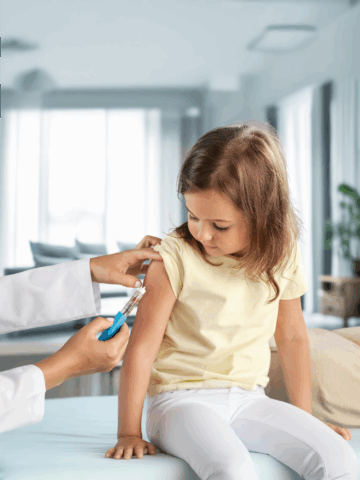Measles is one of the most contagious infections. It is so contagious that up to 90% of close contacts of someone with measles will also get measles if they are not immune. To prevent the spread of measles in a community, about 95% or more of the population must be vaccinated or immune to measles. This is called herd immunity.
Because of global outbreaks and frequent travel, measles is brought back to the U.S. and can spread in populations of under-vaccinated individuals.
Measles is highly contagious and transmitted through the air. Contagious particles can remain in the air for hours after an infected person leaves an area. Symptoms typically begin eight to 10 days after initial exposure to the virus, and then develop in stages. Early symptoms include a high fever – typically between 103 and 105 degrees Fahrenheit – cough, red watery eyes and runny nose. A rash develops around the third day of symptoms, starting on the face and continuing to spread downward over the body as the disease progresses. People are contagious for about four days before the rash begins and four days afterward, according to the U.S. Centers for Disease Control (CDC).
There is no specific antiviral treatment for measles. Supportive care is provided while monitoring for possible complications, such as dehydration due to diarrhea or pneumonia. The CDC reports that pneumonia is the complication most likely to cause death in young children.
The MMR vaccination — which covers measles, mumps and rubella — is administered in two doses. The first dose is usually given between 12-15 months and the second dose at 4-6 years of age. However, the second dose can be given as soon as 28 days after the first dose.
For children traveling internationally, the vaccine is recommended as an extra dose for infants 6 to 11 months of age. To protect those who are unable to receive the vaccination, it’s vital that everyone eligible be vaccinated. Some people, including those with a weakened immune system due to disease or medical treatments, or pregnant women may not be eligible. Ask your healthcare provider for more information. Here’s some tips for making shots less stressful.
According to the U.S. vaccination schedule, people who received two doses of the MMR vaccine as children are usually considered protected for life and don’t need a booster dose.
The measles vaccine is safe and readily available. Following the vaccination, some children have mild reactions, such as short-lived, low-grade fever.
Measles is a very dangerous disease and can lead to complications including ear infections, pneumonia, a brain infection called encephalitis, and death. Before mass vaccination in the 1980s, measles affected three to four million people per year in the U.S., and 400 to 500 died.
We have a very effective and safe vaccine to prevent measles. Getting the measles vaccine is the very best way to prevent measles. All parents should be vaccinating their children at the recommended ages.





